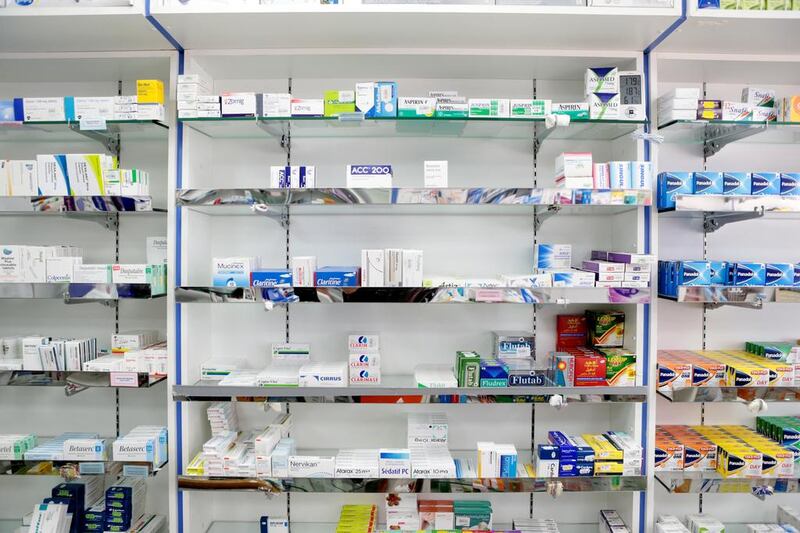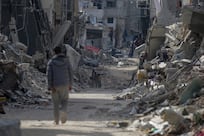Pharmacies are still providing antibiotics to customers without prescriptions, despite warnings by doctors that overuse could leave patients vulnerable to drug-resistant superbugs.
Of seven Dubai pharmacies that were asked which medicine would be suitable after three days of sickness and diarrhoea, three advised a course of antibiotics without prescription.
In Abu Dhabi, three out of five offered to treat the patient with antibiotics, including ercefuryl, negazole and metronidazole, again without prescriptions.
In each case, antibiotics were offered to complement over-the-counter medicine to relieve nausea and vomiting.
Ministry of Health policy states antibiotics should not be offered to patients by pharmacists without a doctor’s prescription.
Those flouting the rules would be warned, then fined. Repeat offenders could have their licences suspended.
“Use of antibiotics is the single most important factor leading to antibiotic resistance,” said Sinil Nair, infection control officer at Mediclinic Welcare Hospital.
“Half the time antibiotics are not optimally prescribed, often done so when not needed, and there is also incorrect dosing or duration.”
In Dubai, We Care Med Pharmacy in Jumeirah Village Triangle, Hills Community Pharmacy in The Springs Town Centre, Meadows Life Pharmacy and Boots in Dubai Marina Mall advised taking Motilium and Imodium to ease symptoms.
Aster Pharmacy in Tecom and Marina Pharmacy in The Greens offered the antibiotic metronidazole without a doctor’s prescription, and Horizon Healthcare Pharmacy in Tecom, suggested taking nifuroxazide, also an antibiotic, for the same symptoms.
Flesh-eating superbug Methicillin-resistant Staphylococcus aureus (MRSA) has become harder to treat as a result of misuse of antibiotics for common colds and sickness, experts say.
“In proportion to the global trend of increasing drug resistance, there is a rise in MRSA and other multidrug resistant organisms here,” Ms Nair said.
Carried by about 2 per cent of the population, MRSA infections are not usually serious but can be life-threatening if they spread to the blood and lungs.
Dr Bassam Mahboub, an immunologist at Sulaiman Habib Hospital, said MRSA was more common in hospitals than in the wider communities, but this was changing.
“Now that we are having more nursing and geriatric facilities, we are seeing more cases coming from the community,” Dr Mahboub said.
“We are more aware as we are frequently screening for MRSA so, naturally, it will be picked up more often.”
Antimicrobial-resistant infections claim at least 50,000 lives each year across Europe and the US, with many hundreds of thousands more dying around the world.
Data supplied by the European Centre for Disease Prevention and Control Antimicrobial Resistance Interactive Database shows that in 15 European countries, more than 10 per cent of bloodstream Staphylococcus aureus infections are caused by MRSA.
Several of these countries recorded resistance rates closer to 50 per cent.
Antibiotic resistance developed when bacteria adapted and grew in the presence of antibiotics.
Common childhood diseases such as malaria, pneumonia, other respiratory infections and dysentery can no longer be cured with many older antibiotics or medicines.
A year ago, the World Health Organisation issued a draft action plan on antimicrobial resistance after a global consensus that it posed “a profound threat to human health”.
The plan aimed to improve awareness and understanding of antimicrobial resistance, strengthen surveillance and research, reduce the incidence of infection, optimise the use of antimicrobial agents and ensure sustainable investment in countering it.
Dr David Cremonesini, a consultant paediatrician at the American Hospital, Dubai, said regular hand washing could help to reduce spreading MRSA.
“MRSA bug is no more dangerous here except there are fewer antibiotics to treat it,” he said. “I have seen some parents who get scared about MRSA but it just needs the right antibiotics.”
Chadi Jaber is co-founder of The Healthy Home, a Dubai company using the latest technology to sanitise homes and reduce spreading infections such as MRSA when reported.
“We always aim to increase awareness of such transferable infections, especially within the education institutions that we work closely with,” Mr Jaber said.
nwebster@thenational.ae
* Additional reporting by Roberta Pennington







